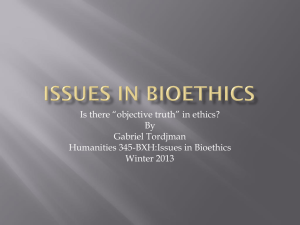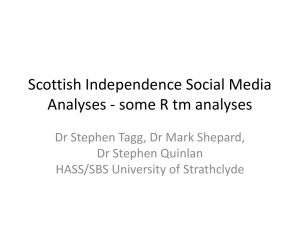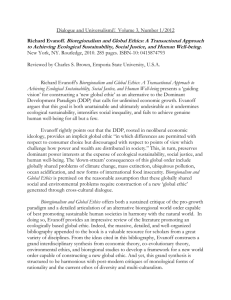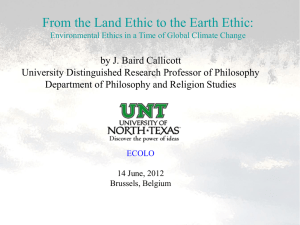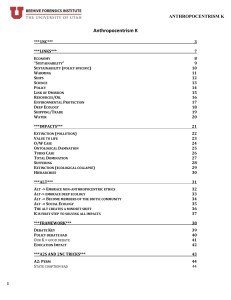Environmental Ethics
advertisement
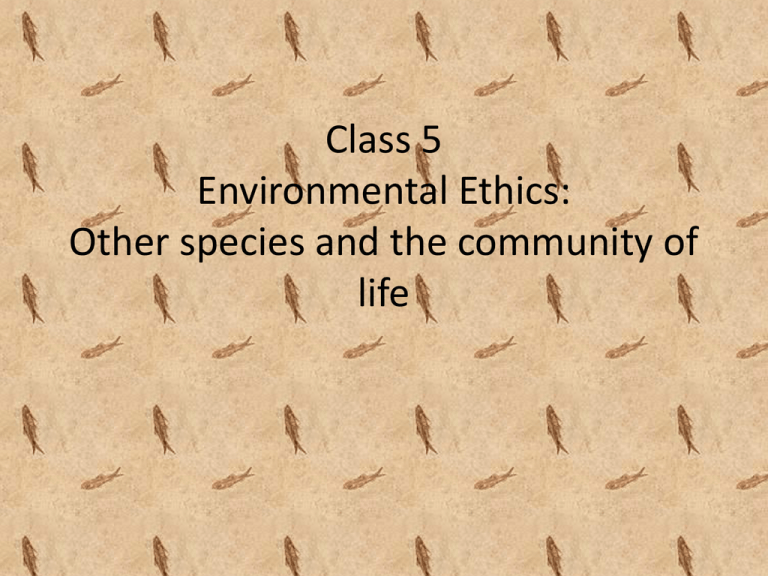
Class 5 Environmental Ethics: Other species and the community of life Environmental ethics addresses the ethical dimensions of our relations to other species and the community of life more generally. Early environmental thinkers • Nature’s value and its relation to human life are important themes from the very origins of both religious and secular ethics. Pre-20th century thinkers who have influenced contemporary environmental philosophy include Saint Francis of Assisi and the American transcendentalists Ralph Waldo Emerson and Henry David Thoreau. Henry David Thoreau Ralph Waldo Emerson Aldo Leopold • Aldo Leopold (1887-1948) is the founder of contemporary environmental ethics. He worked for the U.S. Forest Service until he became a professor of Game Management at the University of Wisconsin in Madison, where he lived until his death fighting a forest fire on a neighbor’s land. The Land Ethic • “The land ethic simply enlarges the boundaries of the community to include soils, waters, plants, and animals, or collectively: the land.” • “A thing is right when it tends to preserve the integrity, stability, and beauty of the biotic community. It is wrong when it tends otherwise.” Silent Spring • Silent Spring, by Rachel Carson (1907-1964), exposed the dangers of pesticides, especially DDT. It led to a public outcry against pesticide use and to the banning of DDT in 1972. Interdependence • A major theme in ecological science and environmental ethics is interdependence “When we try to pick out anything by itself, we find it hitched to everything else in the universe” (John Muir). Anthropocentric and ecocentric • Like environmental ethics, an ethic of sustainability values nonhuman nature, but it integrates that concern with human-centered (anthropocentric) values such as social justice and economic equity. Because of this, “ecocentric” environmental ethics may harder to reconcile with an ethic of sustainability. Holism Many environmental ethics are holistic – more concerned with wholes than individuals. In this model, the ecosystem is primary and individuals are of less concern. Deep Ecology • Deep Ecology was first developed in the 1970s by Norwegian philosopher Arne Næss. In contrast to the “shallow” ecology that focuses on fighting pollution and protecting humans’ quality of life, deep ecology sees humans as interdependent with and morally equal to other life forms on the planet. Earth First! Deep ecology is considered a form of radical environmentalism and exists today in a number of forms that are distinguished according in relation both to spirituality and to political militancy. Ecofeminism • Ecofeminism argues that just as men have subordinated women, humans (particularly males) have subordinated and dominated the natural world, especially in the West. Some ecofeminists argue that women have a special connection to nonhuman nature. Social Ecology Social ecology has roots in anarchism, socialism, and other social justice movements. Social ecologists argue that environmental problems are rooted in unjust, hierarchical social, economic, and political relations. Murray Bookchin (1921-2006) was a leading social ecologist. Environmental Pragmatism • Environmental pragmatists argue that the search for shared theoretical foundations is often destructive and that environmental philosophers should focus on shared practical values and goals. Bioregionalism • Bioregionalism asserts that many environmental and social problems stem from a refusal to live within local ecological limits. It calls for people to become native to their “little places” as a necessary first step toward living sustainably in larger places (Wes Jackson, Becoming Native to This Place). Wes Jackson, President of The Land Institute “The majority of solutions to both global and local problems must take place at the level of the expanded tribe, what civilization calls community” Think Globally? • Some critics argue that bioregionalism encourages people to focus on local problems while ignoring the larger contexts in which those problems have developed. Agrarianism • Like sustainability, agrarianism integrates economic, social, and environmental goals – aiming for self-sufficient communities that respect nature, local culture, and neighborly values. Wendell Berry (b. 1934) is a leading American agrarian thinker. Environmental Justice Environmental justice advocates argue that ecological costs and benefits are distributed unequally within a society and among nations. Religious environmentalism • Many different religious groups have developed their own environmental ethics, based on diverse traditions and texts. These religious ethics may be more or less ecocentric or anthropocentric. Like sustainability ethics, these religious models often link social and environmental values together. Environmental ethics and Sustainability Sustainability is sometimes seen as a synonym for environmentalism. While environmental ethics are important to an ethic of sustainability, sustainability also entails economic and social values.





